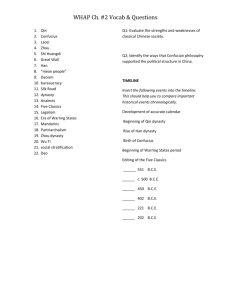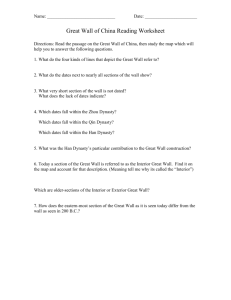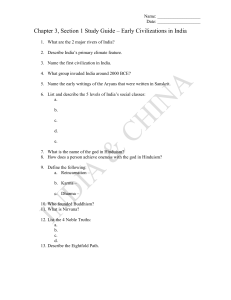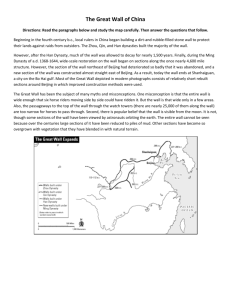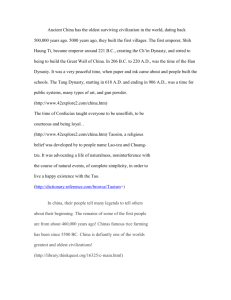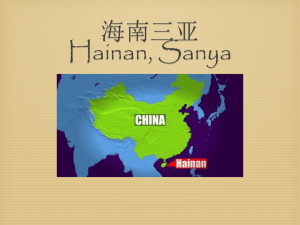ABOUT CHINA
advertisement
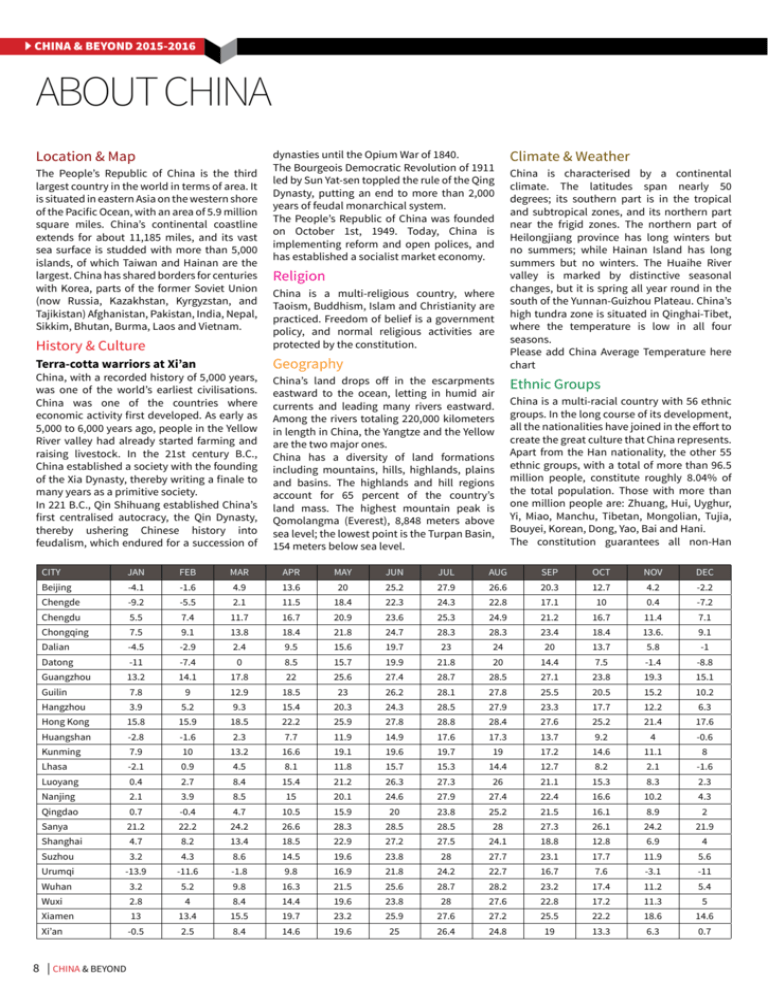
CHINA & BEYOND 2015-2016 ABOUT CHINA Location & Map The People’s Republic of China is the third largest country in the world in terms of area. It is situated in eastern Asia on the western shore of the Pacific Ocean, with an area of 5.9 million square miles. China’s continental coastline extends for about 11,185 miles, and its vast sea surface is studded with more than 5,000 islands, of which Taiwan and Hainan are the largest. China has shared borders for centuries with Korea, parts of the former Soviet Union (now Russia, Kazakhstan, Kyrgyzstan, and Tajikistan) Afghanistan, Pakistan, India, Nepal, Sikkim, Bhutan, Burma, Laos and Vietnam. History & Culture Terra-cotta warriors at Xi’an China, with a recorded history of 5,000 years, was one of the world’s earliest civilisations. China was one of the countries where economic activity first developed. As early as 5,000 to 6,000 years ago, people in the Yellow River valley had already started farming and raising livestock. In the 21st century B.C., China established a society with the founding of the Xia Dynasty, thereby writing a finale to many years as a primitive society. In 221 B.C., Qin Shihuang established China’s first centralised autocracy, the Qin Dynasty, thereby ushering Chinese history into feudalism, which endured for a succession of CITY JAN FEB MAR dynasties until the Opium War of 1840. The Bourgeois Democratic Revolution of 1911 led by Sun Yat-sen toppled the rule of the Qing Dynasty, putting an end to more than 2,000 years of feudal monarchical system. The People’s Republic of China was founded on October 1st, 1949. Today, China is implementing reform and open polices, and has established a socialist market economy. Religion China is a multi-religious country, where Taoism, Buddhism, Islam and Christianity are practiced. Freedom of belief is a government policy, and normal religious activities are protected by the constitution. Geography China’s land drops off in the escarpments eastward to the ocean, letting in humid air currents and leading many rivers eastward. Among the rivers totaling 220,000 kilometers in length in China, the Yangtze and the Yellow are the two major ones. China has a diversity of land formations including mountains, hills, highlands, plains and basins. The highlands and hill regions account for 65 percent of the country’s land mass. The highest mountain peak is Qomolangma (Everest), 8,848 meters above sea level; the lowest point is the Turpan Basin, 154 meters below sea level. APR MAY JUN JUL AUG Climate & Weather China is characterised by a continental climate. The latitudes span nearly 50 degrees; its southern part is in the tropical and subtropical zones, and its northern part near the frigid zones. The northern part of Heilongjiang province has long winters but no summers; while Hainan Island has long summers but no winters. The Huaihe River valley is marked by distinctive seasonal changes, but it is spring all year round in the south of the Yunnan-Guizhou Plateau. China’s high tundra zone is situated in Qinghai-Tibet, where the temperature is low in all four seasons. Please add China Average Temperature here chart Ethnic Groups China is a multi-racial country with 56 ethnic groups. In the long course of its development, all the nationalities have joined in the effort to create the great culture that China represents. Apart from the Han nationality, the other 55 ethnic groups, with a total of more than 96.5 million people, constitute roughly 8.04% of the total population. Those with more than one million people are: Zhuang, Hui, Uyghur, Yi, Miao, Manchu, Tibetan, Mongolian, Tujia, Bouyei, Korean, Dong, Yao, Bai and Hani. The constitution guarantees all non-Han SEP OCT NOV DEC Beijing -4.1 -1.6 4.9 13.6 20 25.2 27.9 26.6 20.3 12.7 4.2 -2.2 Chengde -9.2 -5.5 2.1 11.5 18.4 22.3 24.3 22.8 17.1 10 0.4 -7.2 Chengdu 5.5 7.4 11.7 16.7 20.9 23.6 25.3 24.9 21.2 16.7 11.4 7.1 Chongqing 7.5 9.1 13.8 18.4 21.8 24.7 28.3 28.3 23.4 18.4 13.6. 9.1 Dalian -4.5 -2.9 2.4 9.5 15.6 19.7 23 24 20 13.7 5.8 -1 Datong -11 -7.4 0 8.5 15.7 19.9 21.8 20 14.4 7.5 -1.4 -8.8 Guangzhou 13.2 14.1 17.8 22 25.6 27.4 28.7 28.5 27.1 23.8 19.3 15.1 Guilin 7.8 9 12.9 18.5 23 26.2 28.1 27.8 25.5 20.5 15.2 10.2 Hangzhou 3.9 5.2 9.3 15.4 20.3 24.3 28.5 27.9 23.3 17.7 12.2 6.3 Hong Kong 15.8 15.9 18.5 22.2 25.9 27.8 28.8 28.4 27.6 25.2 21.4 17.6 Huangshan -2.8 -1.6 2.3 7.7 11.9 14.9 17.6 17.3 13.7 9.2 4 -0.6 Kunming 7.9 10 13.2 16.6 19.1 19.6 19.7 19 17.2 14.6 11.1 8 -1.6 Lhasa -2.1 0.9 4.5 8.1 11.8 15.7 15.3 14.4 12.7 8.2 2.1 Luoyang 0.4 2.7 8.4 15.4 21.2 26.3 27.3 26 21.1 15.3 8.3 2.3 Nanjing 2.1 3.9 8.5 15 20.1 24.6 27.9 27.4 22.4 16.6 10.2 4.3 Qingdao 0.7 -0.4 4.7 10.5 15.9 20 23.8 25.2 21.5 16.1 8.9 2 Sanya 21.2 22.2 24.2 26.6 28.3 28.5 28.5 28 27.3 26.1 24.2 21.9 Shanghai 4.7 8.2 13.4 18.5 22.9 27.2 27.5 24.1 18.8 12.8 6.9 4 Suzhou 3.2 4.3 8.6 14.5 19.6 23.8 28 27.7 23.1 17.7 11.9 5.6 Urumqi -13.9 -11.6 -1.8 9.8 16.9 21.8 24.2 22.7 16.7 7.6 -3.1 -11 5.4 Wuhan 3.2 5.2 9.8 16.3 21.5 25.6 28.7 28.2 23.2 17.4 11.2 Wuxi 2.8 4 8.4 14.4 19.6 23.8 28 27.6 22.8 17.2 11.3 5 Xiamen 13 13.4 15.5 19.7 23.2 25.9 27.6 27.2 25.5 22.2 18.6 14.6 Xi’an -0.5 2.5 8.4 14.6 19.6 25 26.4 24.8 19 13.3 6.3 0.7 8 | CHINA & BEYOND
